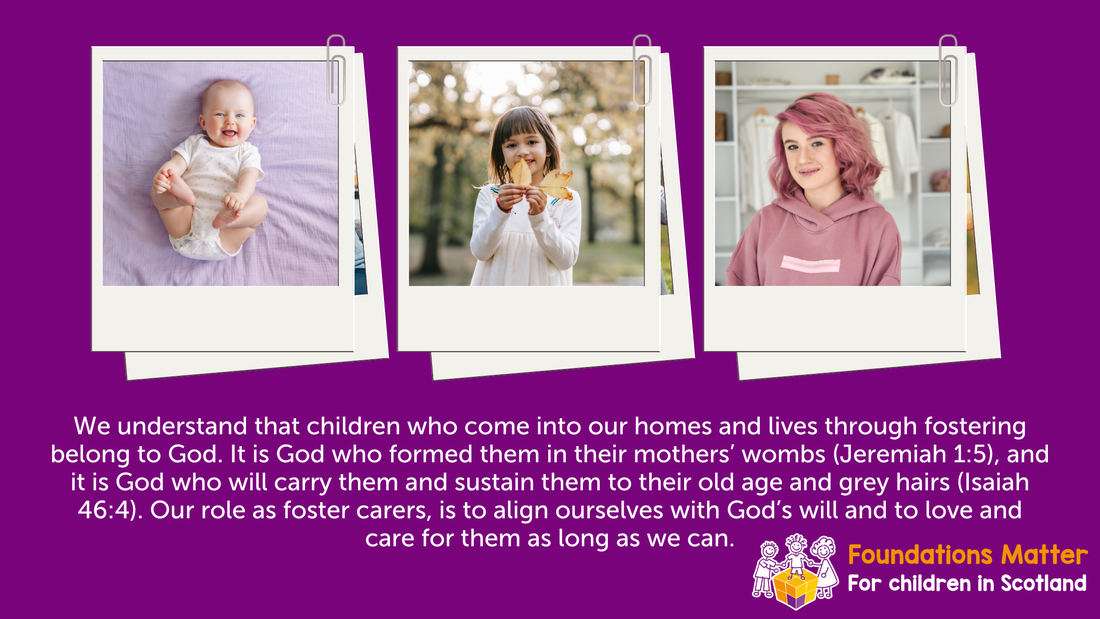|
When it comes to children, the world seems to have an obsession with their future. From a young age we ask them what they want to be when they grow up and we focus our energies on training them to be the type of adult we want them to be. This preoccupation with the future isn’t entirely wrong. It stems from an understanding that the present shapes the future. However, it can detract from appreciating the present. And in some cases, it can even be a hinderance to fostering.
“I could never foster because I wouldn’t be able to let the children go.” This is a common feeling expressed by people when asked about fostering. It’s understandable that one would worry about getting attached to a child and struggle with them transitioning on to another home. This sentiment, however, is not one that a Christian should hold. Firstly, this sentiment fails to recognise just how little control we do have in life. We are not guaranteed tomorrow, even with our own biological children. As Christians, we recognise God’s sovereignty in every situation even with people coming in and out of our lives. Secondly, as Christians, we recognise that God does not hold us accountable for outcomes in people’s lives. He only ever holds us accountable for our actions. In the bible, Paul uses the analogy of sowing to help us understand this. “So neither he who plants nor he who waters is anything, but only God, who makes things grow. The man who plants and the man who waters have one purpose, and each will be rewarded according to his own labour.” (1 Corinthians 3:6-8). How then does this affect how a Christian approach fostering? Well, it means that we understand that children who come into our homes and lives through fostering belong to God. It is God who formed them in their mothers’ wombs (Jeremiah 1:5), and it is God who will carry them and sustain them to their old age and grey hairs (Isaiah 46:4). Our role as foster carers, is to align ourselves with God’s will and to love and care for them as long as we can. In some cases, such as emergency fostering, this might be only a couple of days. And in some cases, it might be for a lifetime. The reality of fostering is that it has a temporal nature to it. Even in long term fostering, permanence is not guaranteed. It can be difficult to hold a long-term love for a child in a seemingly short-term situation. However, God has not called us to do things that He is unable to equip us for. By relying on God’s never-ending love, we can pour out our love on children we foster. Every day we can sow seeds and entrust their future to God, knowing that with Him no experience is ever wasted. Whether we see it or not, our work will bear some fruit. This is fostering; showing up for today, giving our all today, and trusting that tomorrow God will give us all we need to show up for tomorrow. This is fostering; being faithful today while holding on to hope that God will use what we did to shape their tomorrow. Yes, fostering changes children’s futures. But that change happens in a series of todays. Today we do all we can to be there for a child whose past experiences influences how they view the world and respond to daily situations. We understand that in the past their daily experiences were difficult, so healing will happen one daily experience at a time. By God’s grace and strength, we can show up with consistency, empathy, and compassion. It isn’t easy, and sometimes there are tears, and pain and arguments, and sorrow. But when we show up consistently, joy and love start to take root. The good moments may be few and far between in the beginning, but slowly, they start to add up. The smiles start to come more often and the laughter flows a bit more freely. Eventually the good moments add up into good days and slowly the good days start to outweigh the bad days. We just need to take it one day at a time.
0 Comments
Leave a Reply. |
AuthorWrite something about yourself. No need to be fancy, just an overview. Archives
November 2022
Categories |


 RSS Feed
RSS Feed

